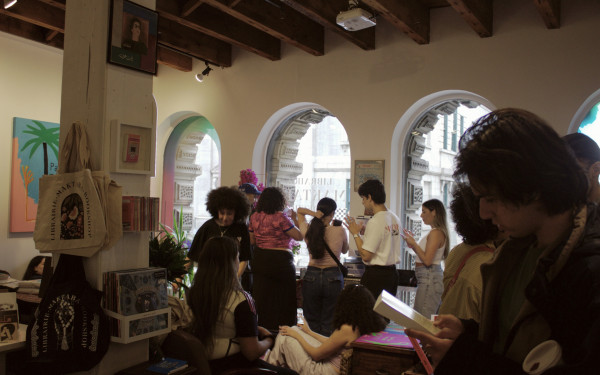Celebrating Indigenous creativity
Micro ouvert autochtone showcased Indigenous art and performance at Place des Arts
The fourth edition of Micro ouvert autochtone took place at Place des Arts on Nov. 9 and Nov. 10, aiming to promote Indigenous artists and craftsmanship. The event was organized by Nina Segalowitz, an Inuvialuit throat singer, Concordia alumnus and survivor of the Sixties Scoop.
The Sixties Scoop was a period of Canadian history in which the Canadian government used child welfare policies to take or “scoop up” Indigenous children from their families and place them in white foster homes. Despite its name, it actually began in the mid-1950s, and concluded in the mid-1980s.
“I want to highlight the relationship between elders and youth, trying to connect the past and the future, because without them there is no link,” Segalowitz said.
Beginning at noon, the event welcomed visitors into the east wing of Place des Arts with a series of vendors selling various native goods. These included handcrafted jewelry, books, clothing and unique items like Inuit snow goggles made from wood, each pair featuring its own ink design. One vendor served wraps, bannock topped with taco salad, and Three Sisters Soup, a stew that consists of corn, squash and beans.
One such vendor was beekeeper Tealey Ka’senni:saks, another survivor of the Sixties Scoop.
“Selling honey is my way of connecting to the community. It's an opportunity to connect when people ask about the benefits of honey, and to let them know how we need to take care of the land, and all the creatures that are here,” Ka’senni:saks said.
At 3 p.m., attendees enjoyed a musical performance by jazz quintet Backwater Township, led by Corey Thomas of the Mi’kmaq First Nation.

“When [jazz] originally began, Indigenous people were involved with the heavy lifting,” Thomas said. “My teacher had me learn this song ‘Blues in the Closet’ and I checked it out, and it was by a guy named Oscar Pettiford, which inspired me to ask about how many other Indigenous people participated in this kind of music.”
It only takes a quick Google search to find people like Oscar Pettiford, Big Chief Russell Moore and Mildred Bailey, all Indigenous artists of note who achieved success during the golden age of jazz music.
Blackwater Township’s roughly 30-minute set featured various jazz compositions speaking out against issues such as colonialism, cultural erasure and COVID-19 isolation. One song is entitled “Kesalul,” the Mi’kmaq word for love. Notably, alternate spellings of the word in Mi’kmaq can convey drastically different meanings: ‘Kesalul’ means “I love you,” ‘kesa’lul’ means “I hurt you,” and ‘ke’sa’lul’ means “I put you into the fire.”
The quintet ended its set with “Come and Get Your Love,” originally written by the Mexican Indigenous band Redbone, who achieved success in the 1970s. Blackwater Township played the cover in their swinging style, with saxophones carrying the melody and Thomas’s upright bass driving the rhythm.
The 2024 edition of Micro ouvert autochtone was a celebration of a myriad of aspects of Indigenous culture.
“I'm proud of the team here at Place des Arts,” Segalowitz said. “Because there's an incredible openness for Indigenous talent in all mediums. For them to host this is literally a dream team.”







_1_600_375_90_s_c1.jpg)